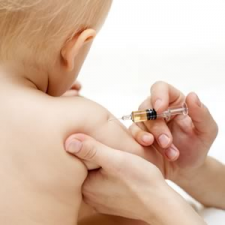Meningitis B has been in the national press following the high profile case of Faye Burdett

NHS programme
In 2015 the meningitis B vaccine Bexsero (GSK) was added to the childhood immunisation schedule
This followed the recommendation of the JCVI
Three doses are given in total:
- 2 months
- 4 months
- 12 months
Private vaccination
Whilst the current immunisation schedule aims to protect the most vulnerable patients, it is very restrictive and there will be concerned parents of children not eligible for NHS vaccination.
Until recently the vaccine was widely available as a private service through GPs, clinics and some pharmacies.
However, the demands of increased supply have led to a shortage of the vaccine which is now being reserved for the NHS programme.
Private clinics have been asked not to take on any new patients. Children who have already received a dose should be able to receive their booster doses.
Bexsero supply - Statement from GlaxoSmithKline (February 2016)
"Due to unexpected global demand for Bexsero during 2015, we are experiencing supply constraints during the first half of this year.
Although vaccination through the NHS childhood programme has been prioritised and is unaffected, we have unfortunately had to ask private clinics temporarily to not start new courses of vaccination. Children who have already started their course of the vaccine privately should still be able receive their follow up doses.
We know the unexpectedly high demand for the vaccine reflects the importance parents have placed on protecting their children from meningitis B. We hope to have improving supply from summer 2016 and we are working hard to increase capacity in 2017."
Advice to parents
Around 10% of the population carries meningococcal bacteria in the back of their throat or nose without causing any illness. This increases to around 25% in teenage/student populations.
It is transmitted by inhaling respiratory droplets from the mouth and throat or by direct contact (eg kissing). Close and prolonged contact is usually needed for transmission.
In 2014/15, meningitis B caused 418 cases of invasive disease in England out of a total of 724. [2]
Parents should be aware of, and remain vigilant for, the symptoms of meningitis and septicaemia. NHS Choices
Infections usually presents with:
- fever
- vomiting
- headache
- feeling unwell
This can be followed by:
- limb and joint pain
- pale or mottled skin
- cold hands and feet
As the infection progresses a characteristic non-fading rash may develop along with:
- neck stiffness
- aversion to bright lights
- confusion
The symptoms usually begin suddenly and get rapidly worse.
If you suspect bacterial meningitis, dial 999 immediately and ask for an ambulance.
Meningitis B
Meningococcal group B bacteria is a serious cause of life-threatening infections, including meningitis and blood poisoning, and the leading infectious killer of babies and young children in the UK. [1]
Meningitis and septicaemia caused by meningococcal group B bacteria can affect people of any age, but is most common in babies and young children.
Meningococcal group B bacteria are responsible for around 90% of all meningococcal infections in the UK. [1]
The NHS programme makes England the first country in the world to offer a publicly funded Men B vaccination programme.
The Meningitis Research Foundation is currently seeking donations to fund research
Other meningococcal vaccines
There are currently two other meningitis vaccines available as part of the routine immunisation programme. The use of these vaccines are specific and is not interchangeable.
Meningitis C is given at 3 months and twelve months as part of the childhood immunisation programme. Since its introduction in 1999 incidence of meningitis C has been reduced by 96%, with 28 cases confirmed in 2014/15.
Meningitis ACWY is given at 14 years and to first-time students as part of the childhood immunisation programme. It is also used to protect people travelling abroad. Numark provides the PGD (subject to online assessment) as part of the flu training programme.
References
- NHS Choices; Men B vaccine; accessed online 22/2/16

- Public Health England; Health Protection Report; Infection report; Volume 9 Number 38 Published on: 23 October 2015; Invasive meningococcal disease (laboratory reports in England): 2014/2015 annual data by epidemiological year; accessed online 22.2
